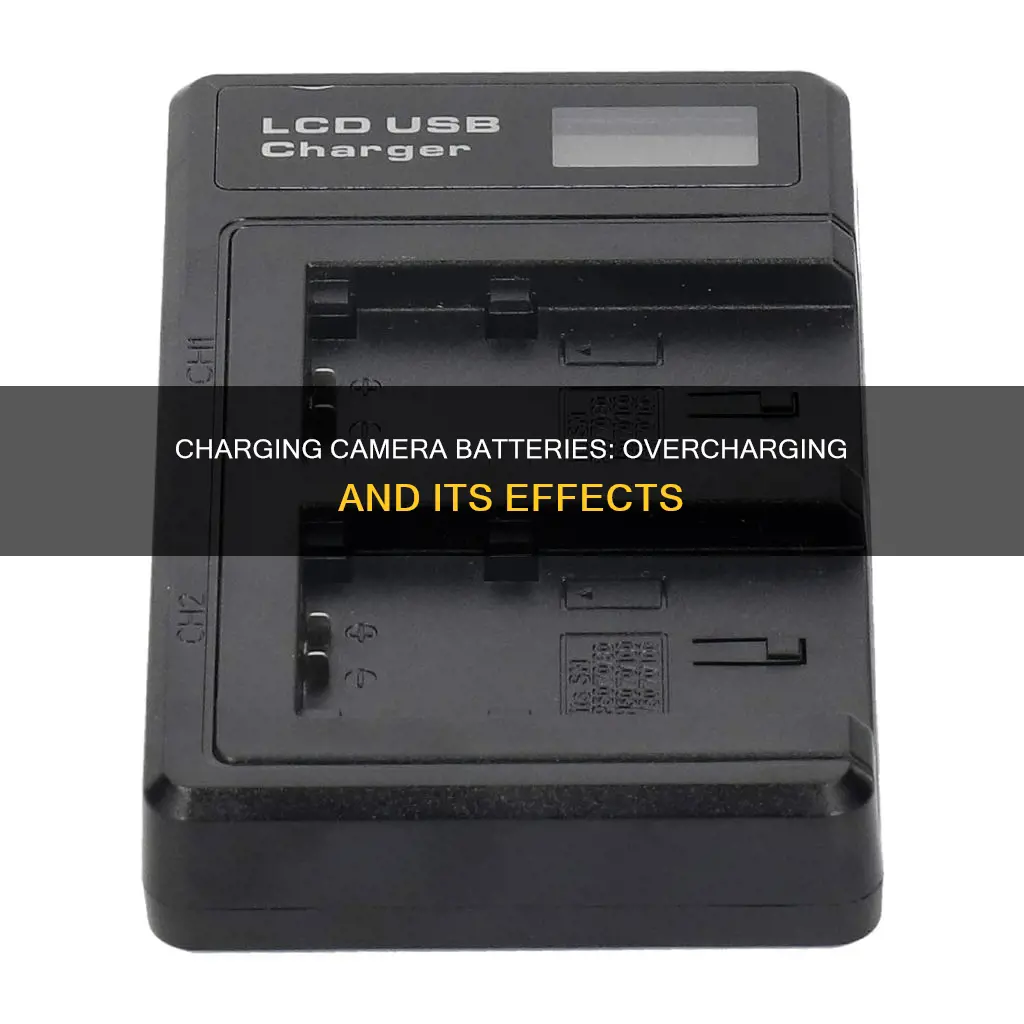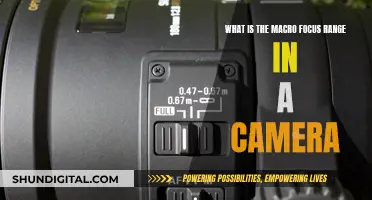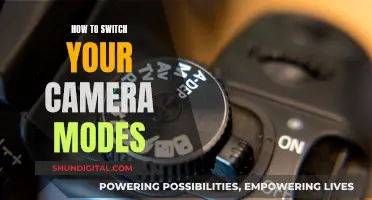
It is generally agreed that it is not possible to overcharge a camera battery, as most modern camera batteries have a built-in mechanism that prevents overcharging. This means that once the battery is fully charged, the charging process will stop automatically. However, it is still important to monitor the charging process and not leave the battery plugged in for extended periods, as this can cause damage that will reduce the performance and service life of the battery.
| Characteristics | Values |
|---|---|
| Can camera batteries be overcharged? | Most modern camera batteries cannot be overcharged because they have a built-in mechanism that prevents overcharging. |
| What happens if you overcharge a camera battery? | Overcharging can damage the battery and reduce its lifespan. In the worst-case scenario, the battery may overheat, swell, leak, or explode. |
| How to avoid overcharging a camera battery? | Follow the manufacturer's instructions for charging, avoid leaving the battery plugged in for extended periods, and use the charger that came with the camera or a compatible replacement. |
| How do I know if my camera battery is overcharging? | If the battery is getting unusually hot while charging, turn off the power as this may indicate a risk of fire. |
What You'll Learn

Lithium-ion batteries and overcharging
Lithium-ion batteries are a popular choice for consumer and professional cameras. They are rechargeable and have high energy density, meaning they can store a lot of energy in a small volume. However, they can be dangerous if overcharged.
Overcharging occurs when a battery is charged beyond its specified voltage. This can be very damaging to the battery and, in some cases, dangerous for the user. Lithium-ion batteries are particularly susceptible to overcharging, as they can become unstable and experience thermal runaway. Thermal runaway can lead to the battery catching fire or even exploding.
To prevent overcharging, lithium-ion batteries are typically equipped with overcharge protection circuits. These circuits monitor the battery's state of charge and cut off the current when the limit is reached. The chargers for these batteries are also designed to shut off automatically when the battery reaches full charge. As a result, it is not possible to overcharge a lithium-ion battery under normal circumstances.
However, it is important to note that leaving a lithium-ion battery on the charger for an extended period can still cause damage. While the overcharge protection will prevent the battery from exceeding its capacity, the battery will begin to self-discharge. If the battery's charge falls below a certain threshold, the charger will kick in again and start recharging. Repeated charging cycles can reduce battery performance and life. Therefore, it is recommended to remove the battery from the charger once it has reached full charge.
In summary, while it is not possible to overcharge a lithium-ion battery due to built-in safety measures, leaving the battery on the charger for too long can still cause damage. To ensure optimal battery performance and longevity, it is important to follow the manufacturer's guidelines for charging and storing the battery.
Charging the Eufy 2C: Know When It's Ready
You may want to see also

Safeguards against overcharging
Lithium-ion batteries, such as those used in cameras, can be dangerous if overcharged. They can catch fire or explode. Therefore, it is important to have safeguards in place to prevent overcharging. Here are some measures to protect against overcharging:
- Use a protected battery: A protected battery has built-in safety features, such as a protection circuit, that prevent overcharging, overdischarging, and short circuits. This circuitry monitors and regulates the flow of electricity, ensuring the battery operates within safe limits.
- Utilize a Battery Management System (BMS): A BMS monitors the charge cycle and prevents overcharging by cutting off the power if necessary. It also provides alerts if the cell voltages become too low or high, helping to extend battery life.
- Use a suitable charger: Ensure the charger matches the voltage and ampere-hour capacity of the lithium battery. A suitable charger will also have a charging protection function to prevent overcharging and failure.
- Avoid full charge and discharge: Keeping lithium batteries between 10% and 90% charged is more conducive to protecting the battery. Avoid charging digital products to the maximum value.
- Avoid fast charging: Fast charging can strain and damage lithium cells. Normal charging is preferable to maintain the long-term health of the battery.
- Store the battery properly: Lithium-ion batteries should be stored at a cool temperature (around 15°C or 59°F) and kept between 30% and 70% charged. Perform a charge-discharge cycle every 3-6 months.
- Use the correct battery and charger: Always use the battery and charger supplied with your camera. Mismatched chargers and batteries can lead to overcharging as the charger may not detect when to stop charging.
Charging Your Panasonic DMC-G6 Camera via USB
You may want to see also

Overnight charging
It is generally considered safe to charge camera batteries overnight. Most modern Lithium-ion (Li-ion) batteries, which are commonly used in cameras, cannot be overcharged because they include overcharge protection. This means that charging will automatically stop when the battery reaches 100% capacity.
However, it is important to note that leaving a Li-ion battery in the charger for an extended period of time after it has reached full charge can cause damage that will reduce the performance and service life of the battery. This is because the battery will begin to self-discharge, and the charger will kick in and recharge the battery to full capacity once its charge falls to a certain level (94% in the case of a Canon LP-E6NH battery). Keeping the battery at or close to 100% capacity can reduce battery performance and life, as the high voltage will stress the battery.
Therefore, while it is convenient to charge your camera battery overnight, it is recommended to remove the battery from the charger once it has completed recharging to maintain optimal battery health. If you are concerned about maximising battery life, consider charging the battery before bedtime so that you can remove it from the charger as soon as it reaches full capacity.
Overnight Charging: Is It Damaging Your Camera Battery?
You may want to see also

Third-party batteries
While some people may advise against using third-party batteries, no reputable battery maker will sell a product that is likely to burst into flames or explode. Reviews of third-party batteries rarely mention serious incidents unless the battery was first damaged or faulty. However, it's important to note that using third-party batteries will usually void your camera's warranty if something goes wrong.
When it comes to performance, third-party batteries may not always live up to their OEM counterparts. Some users report that third-party batteries deplete faster or have shorter lifespans. Additionally, camera companies often fix" battery problems with firmware upgrades that can lock out third-party batteries, rendering them useless. It's also worth noting that third-party batteries may not always be compatible with your camera's charging accessories, such as the original brand charger or in-camera charging capabilities.
Despite these potential drawbacks, many photographers choose to use third-party batteries and are happy with their decision. To ensure a positive experience, it's essential to purchase third-party batteries from reputable companies and dealers. Some recommended brands include BM Premium, Neewer, Wasabi Power, and RavPower. These companies offer batteries with decent capacities and charge times, and they often include safety guarantees and warranties.
In summary, while there are some risks associated with third-party batteries, they can be a cost-effective option for photographers who need multiple backup batteries. By choosing reputable brands and doing thorough research, you can minimise the chances of encountering issues and maximise your savings.
Charging Your Polaroid: A Step-by-Step Guide to Powering Up
You may want to see also

Heat damage
Camera batteries can be damaged by heat, and this can reduce their performance and service life.
Lithium-ion batteries, such as those used in many cameras, can catch fire or explode if they overheat or are overcharged. However, most Li-ON battery chargers have built-in safeguards to prevent overcharging, so the risk of fire or explosion is low. That said, it's still important to use the correct charger for your battery and to unplug the charger once the battery is fully charged. Leaving a battery in a charger for too long may cause damage, reducing its performance and lifespan.
When shooting in hot conditions, it's important to keep your camera and batteries cool. Spare batteries should be kept in an insulated container or wrapped in something like a fleece jacket to limit their exposure to high temperatures. It's also a good idea to keep your camera and flash out of direct sunlight as much as possible. If you're walking between locations, consider taking the batteries out of your camera and carrying them separately, as the padding in your bag can act as insulation, trapping heat inside.
In very hot conditions, you may also want to consider using a white camera bag or a white or reflective cover for your bag, as dark objects absorb more heat. You can also purchase thermal bags designed to keep food cool, which may help keep your equipment from overheating.
Camera Battery Life: AA Power Explained
You may want to see also
Frequently asked questions
No, it is not possible to overcharge most modern camera batteries. They are designed to stop charging automatically when they reach full capacity.
Although it won't overcharge the battery, leaving it in the charger for extended periods can cause damage due to the heat generated by the charger. This will reduce the battery's lifespan and performance.
Overcharging occurs when a battery is charged beyond its full capacity. This can cause the battery to overheat, swell, and possibly explode or catch fire.







